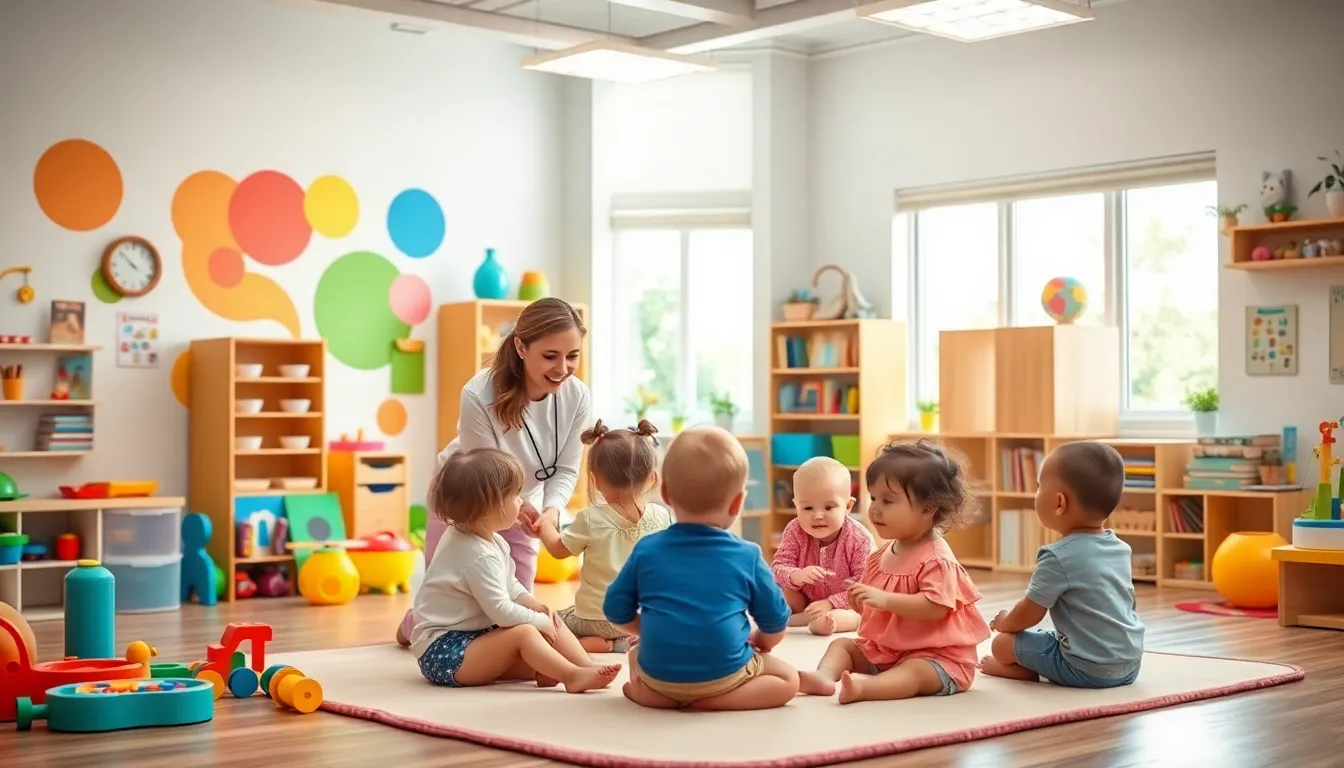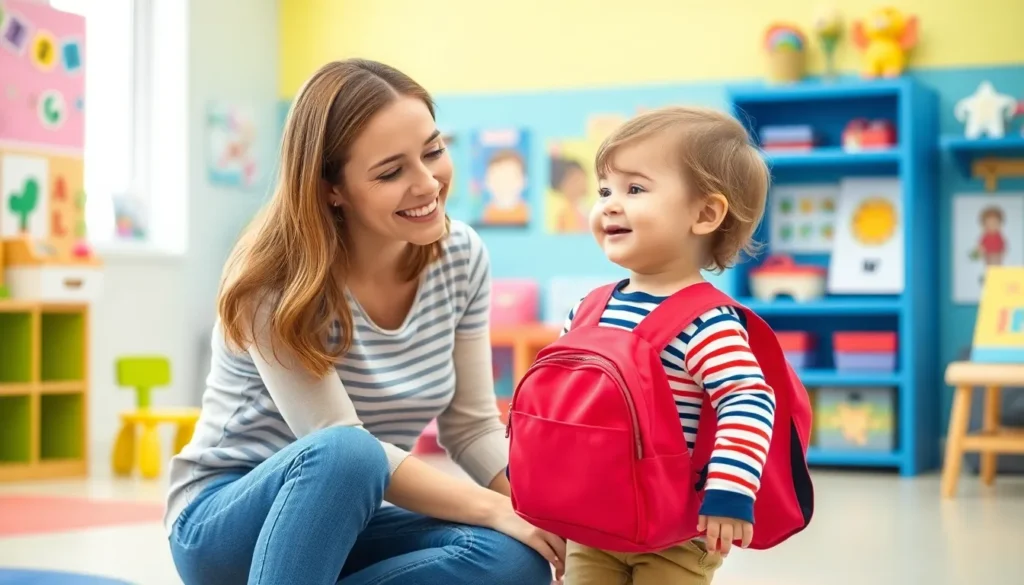Preparing a toddler for daycare can feel like a daunting task for many parents. It’s not just about finding the right facility; it’s about ensuring their little one is emotionally and physically ready for this new adventure. As children transition from home to daycare, they encounter a world of new experiences, routines, and social interactions that can shape their early development.
Understanding the importance of this preparation can make all the difference. Parents can ease their child’s anxiety and foster a sense of security by establishing routines, discussing what to expect, and practicing separation. With the right approach, this transition can be a positive experience for both toddlers and their parents, setting the stage for a successful journey in early childhood education.
Table of Contents
ToggleUnderstanding Toddler Daycare Preparation
Preparing toddlers for daycare involves careful planning and consideration. Effective preparation can alleviate anxiety and foster a smoother transition for both children and parents.
The Importance of Early Preparation
Early preparation is crucial for a successful daycare experience. It helps children adapt to new routines and enhances emotional resilience. Research indicates that toddlers who engage in gradual exposure to daycare settings exhibit decreased separation anxiety. Establishing a consistent daily routine, including specific wake-up and bedtime schedules, aids in creating predictability. Practicing drop-offs can also help familiarize toddlers with the daycare environment, making it easier for them to adapt.
Common Concerns for Parents
Parents often navigate multiple concerns when preparing toddlers for daycare. Common worries include separation anxiety, peer interactions, and adaptation to a structured routine. Parents may fear their children won’t bond with caregivers or adjust to new social dynamics. To address these concerns, open communication with caregivers is vital. Regular updates on a child’s progress can ease parental anxiety. Additionally, engaging in discussions about feelings can help toddlers express their emotions, fostering emotional intelligence during this critical transition.
Choosing the Right Daycare

Selecting a daycare for a toddler involves careful consideration of various factors. Parents should focus on both practical elements and the overall environment to ensure their child’s well-being and development.
Factors to Consider
- Location: Choose a daycare situated close to home or work for convenience and accessibility.
- Licensing: Verify that the daycare meets state licensing requirements to ensure compliance with safety and health regulations.
- Curriculum: Examine the curriculum offered. A structured program that fosters cognitive, social, and emotional development is essential.
- Hours of Operation: Evaluate if the hours align with the family’s schedule, including options for extended care if needed.
- Cost: Consider the tuition fees and any additional charges. Budgeting can help determine what’s financially feasible.
- Recommendations: Seek recommendations from friends, family, or online reviews. Personal experiences can provide valuable insights.
Evaluating Facilities and Staff
- Cleanliness: Visit the daycare to assess cleanliness and organization. A well-maintained environment promotes health and safety.
- Staff Qualifications: Review staff qualifications and training. Look for early childhood education credentials and certifications in first aid or CPR.
- Staff-to-Child Ratio: Confirm the staff-to-child ratio. Smaller ratios allow for more individual attention and support for each child.
- Caregiver Interactions: Observe interactions between caregivers and children. Positive, nurturing relationships are fundamental for emotional development.
- Safety Measures: Inquire about safety protocols, emergency procedures, and supervision practices. A safe environment is crucial for peace of mind.
- Parent Communication: Evaluate how the facility communicates with parents. Regular updates and open lines of communication foster a collaborative relationship.
Considering these factors ensures a thoughtful approach to choosing the best daycare for a toddler, promoting a positive transition into early childhood education.
Preparing Your Toddler Emotionally
Preparing a toddler emotionally for daycare involves strategies that foster confidence and social readiness. Establishing a supportive environment promotes smooth transitions and lessens anxiety in new situations.
Building Independence
Building independence in toddlers encourages self-reliance and confidence. Parents can provide simple daily tasks, such as dressing or picking up toys. Setting up a consistent routine, with specific times for activities, helps toddlers understand what to expect. Allowing toddlers to make choices, like selecting toys or snacks, enhances their decision-making skills. Practicing short separations, such as leaving with a trusted caregiver for brief periods, can ease anxiety about longer stays in daycare settings.
Encouraging Social Skills
Encouraging social skills prepares toddlers for interactions with peers and caregivers. Arranging playdates fosters sharing and cooperation. Group activities, like arts and crafts, promote teamwork and communication. Role-playing scenarios, such as taking turns or resolving conflicts, helps toddlers navigate social situations. Teaching basic phrases, like “please” and “thank you,” improves manners and builds confidence in social interactions. Engaging in discussions about feelings enhances emotional intelligence, helping toddlers express themselves and understand others.
Logistics of Toddler Daycare Preparation
Effective logistical planning eases the transition into daycare for toddlers. Focus on organizing supplies and establishing routines to support both child and parent.
Organizing Supplies and Essentials
Gather essential items before the first day of daycare. Include:
- Clothing: Prepare multiple outfits, considering the weather and activities. Choose comfortable, durable materials.
- Diapers and Wipes: Pack enough to last the day. Include extras for unexpected situations.
- Snacks and Meals: Provide healthy options. Label containers to avoid mix-ups.
- Comfort Items: Include a favorite toy or blanket for emotional support.
- Personal Items: List any necessary medications, allergens, or special needs to inform caregivers.
Organizing these supplies promotes a smooth experience and minimizes stress for both parents and toddlers.
Creating a Routine
Establishing a consistent daily schedule prepares toddlers for daycare. Consider the following strategies:
- Morning Routine: Develop a step-by-step process for getting dressed, eating breakfast, and packing supplies. Encourage independence with simple tasks.
- Drop-off Protocol: Practice separation through brief goodbyes. Keep a positive, reassuring demeanor to diminish anxiety.
- Evening Routine: Designate time for relaxation and discussions about the daycare day. Encourage sharing emotions and experiences.
- Weekend Preparation: Use weekends for familiarization with daycare routines. Engage in play activities that mirror the daycare environment.
Creating these routines fosters a sense of security, helping toddlers adjust to new experiences and settings.
Preparing toddlers for daycare is a vital step in ensuring a positive transition into early childhood education. By focusing on emotional readiness and establishing routines parents can ease their child’s anxiety and foster independence. Open communication with caregivers further supports this process and builds trust.
Choosing the right daycare requires careful consideration of various factors that align with a child’s needs. Parents should prioritize a supportive environment that encourages social interaction and emotional growth. With thoughtful planning and preparation parents can create a smooth experience that benefits both them and their toddlers. Embracing this journey together sets the foundation for a successful daycare experience and lifelong learning.



